
generative-ai-js
The official Node.js / Typescript library for the Google Gemini API
Stars: 1098
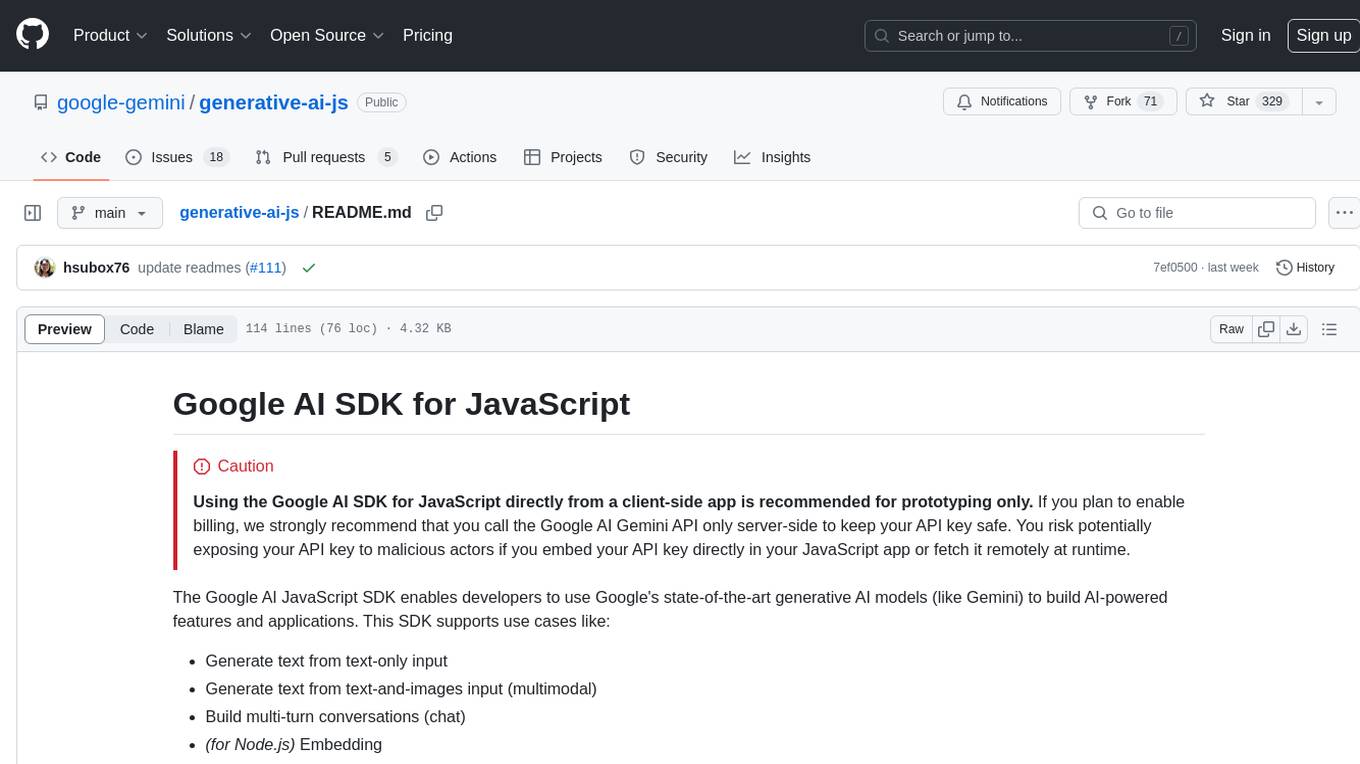
Generative AI JS is a JavaScript library that provides tools for creating generative art and music using artificial intelligence techniques. It allows users to generate unique and creative content by leveraging machine learning models. The library includes functions for generating images, music, and text based on user input and preferences. With Generative AI JS, users can explore the intersection of art and technology, experiment with different creative processes, and create dynamic and interactive content for various applications.
README:
The Google AI JavaScript SDK is the easiest way for JavaScript developers to build with the Gemini API. The Gemini API gives you access to Gemini models created by Google DeepMind. Gemini models are built from the ground up to be multimodal, so you can reason seamlessly across text, images, and code.
[!CAUTION] Using the Google AI SDK for JavaScript directly from a client-side app is recommended for prototyping only. If you plan to enable billing, we strongly recommend that you call the Google AI Gemini API only server-side to keep your API key safe. You risk potentially exposing your API key to malicious actors if you embed your API key directly in your JavaScript app or fetch it remotely at runtime.
- Go to Google AI Studio.
- Login with your Google account.
- Create an API key. Note that in Europe the free tier is not available.
- Try the Node.js quickstart
See the Node.js quickstart for complete code.
- Install the SDK package
npm install @google/generative-ai- Initialize the model
import { GoogleGenerativeAI } from "@google/generative-ai";
const genAI = new GoogleGenerativeAI(process.env.API_KEY);
const model = genAI.getGenerativeModel({ model: "gemini-1.5-flash" });- Run a prompt
const prompt = "Does this look store-bought or homemade?";
const image = {
inlineData: {
data: Buffer.from(fs.readFileSync("cookie.png")).toString("base64"),
mimeType: "image/png",
},
};
const result = await model.generateContent([prompt, image]);
console.log(result.response.text());This repository contains sample Node and web apps demonstrating how the SDK can access and utilize the Gemini model for various use cases.
To try out the sample Node app, follow these steps:
-
Check out this repository.
git clone https://github.com/google/generative-ai-js -
Obtain an API key to use with the Google AI SDKs.
-
cd into the
samplesfolder and runnpm install. -
Assign your API key to an environment variable:
export API_KEY=MY_API_KEY. -
Open the sample file you're interested in. Example:
text_generation.js. In therunAll()function, comment out any samples you don't want to run. -
Run the sample file. Example:
node text_generation.js.
See the Gemini API Cookbook or ai.google.dev for complete documentation.
See Contributing for more information on contributing to the Google AI JavaScript SDK.
The contents of this repository are licensed under the Apache License, version 2.0.
For Tasks:
Click tags to check more tools for each tasksFor Jobs:
Alternative AI tools for generative-ai-js
Similar Open Source Tools

generative-ai-js
Generative AI JS is a JavaScript library that provides tools for creating generative art and music using artificial intelligence techniques. It allows users to generate unique and creative content by leveraging machine learning models. The library includes functions for generating images, music, and text based on user input and preferences. With Generative AI JS, users can explore the intersection of art and technology, experiment with different creative processes, and create dynamic and interactive content for various applications.
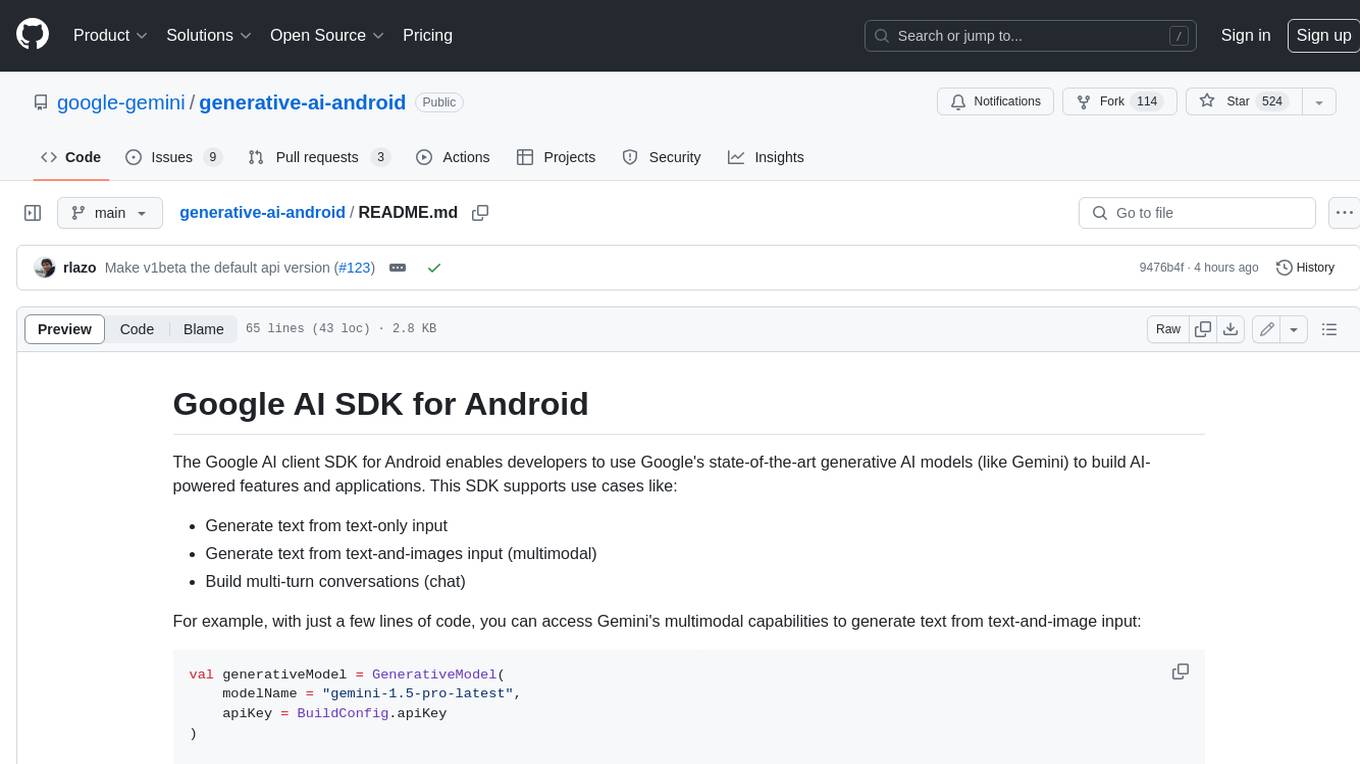
generative-ai-android
The Google AI client SDK for Android enables developers to use Google's state-of-the-art generative AI models (like Gemini) to build AI-powered features and applications. This SDK supports use cases like: - Generate text from text-only input - Generate text from text-and-images input (multimodal) - Build multi-turn conversations (chat)
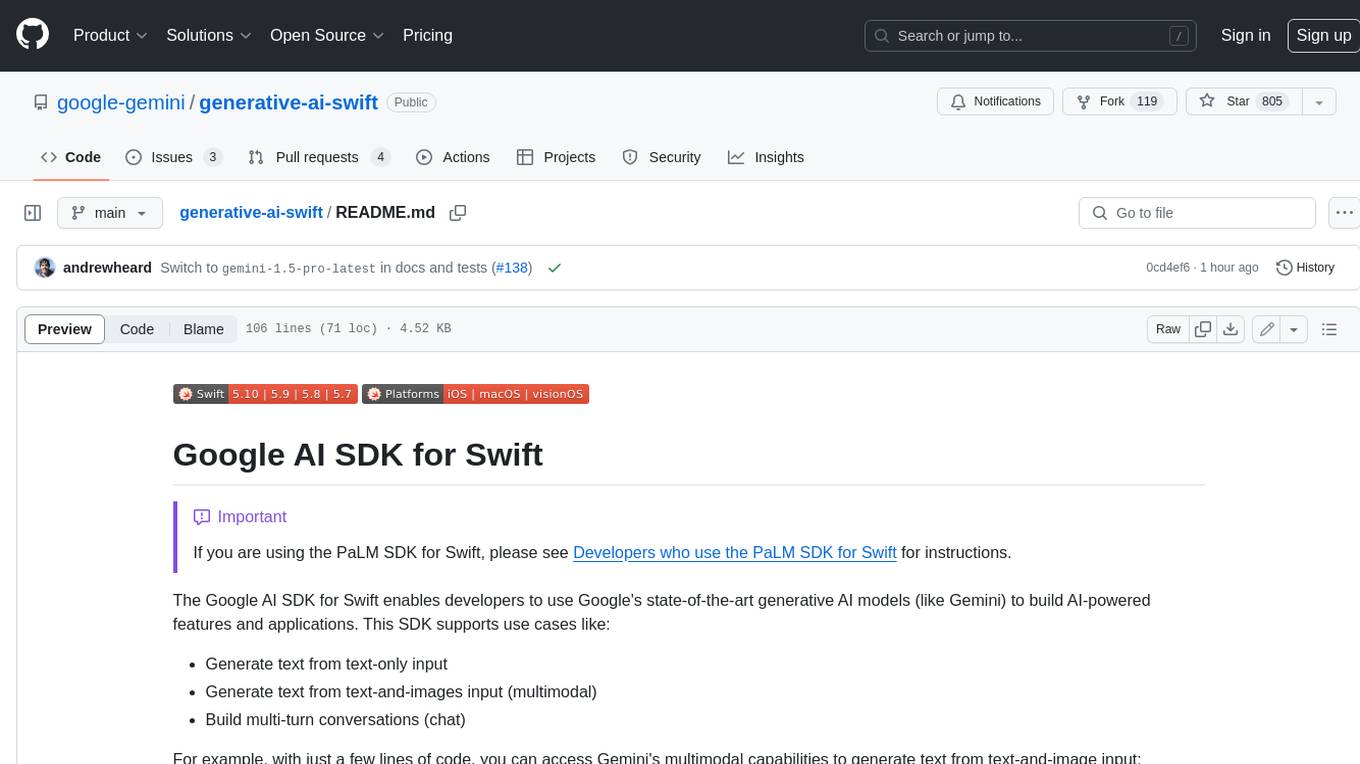
generative-ai-swift
The Google AI SDK for Swift enables developers to use Google's state-of-the-art generative AI models (like Gemini) to build AI-powered features and applications. This SDK supports use cases like: - Generate text from text-only input - Generate text from text-and-images input (multimodal) - Build multi-turn conversations (chat)
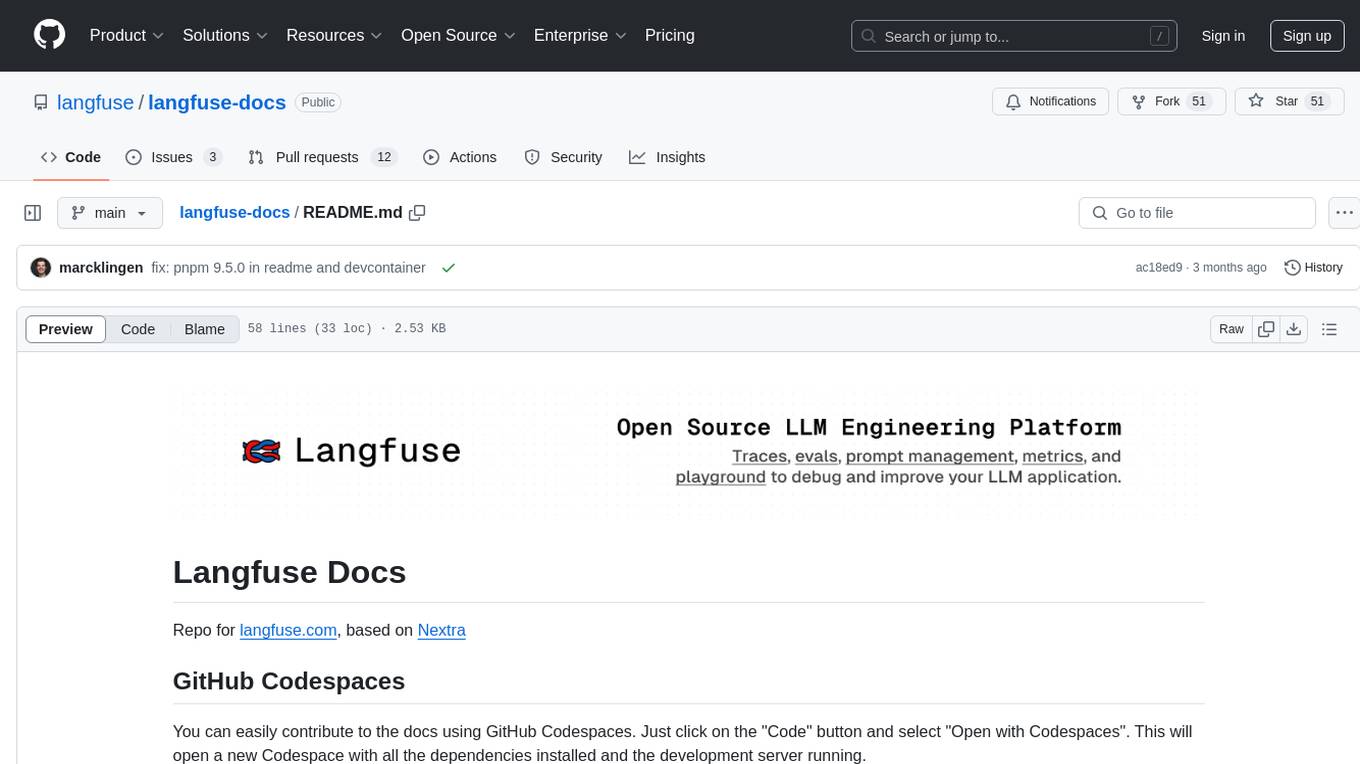
langfuse-docs
Langfuse Docs is a repository for langfuse.com, built on Nextra. It provides guidelines for contributing to the documentation using GitHub Codespaces and local development setup. The repository includes Python cookbooks in Jupyter notebooks format, which are converted to markdown for rendering on the site. It also covers media management for images, videos, and gifs. The stack includes Nextra, Next.js, shadcn/ui, and Tailwind CSS. Additionally, there is a bundle analysis feature to analyze the production build bundle size using @next/bundle-analyzer.
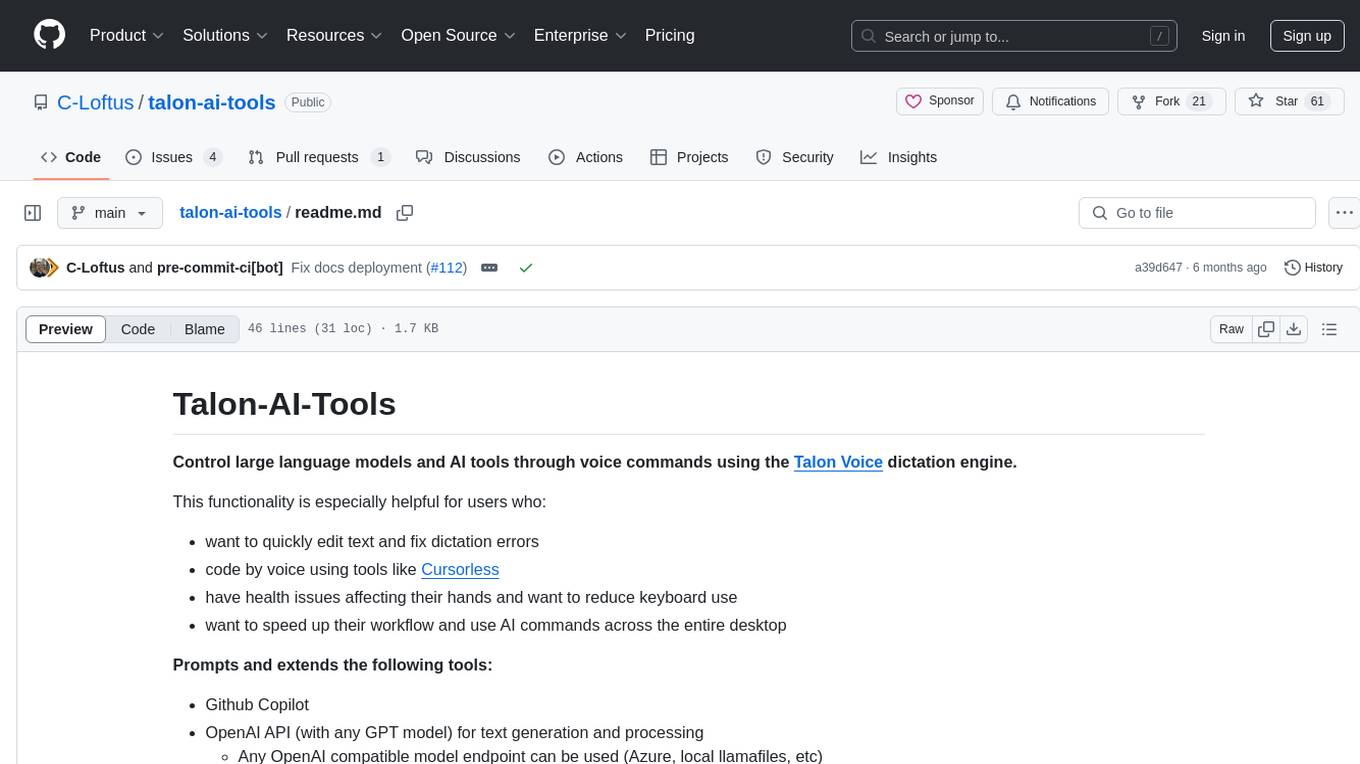
talon-ai-tools
Control large language models and AI tools through voice commands using the Talon Voice dictation engine. This tool is designed to help users quickly edit text, code by voice, reduce keyboard use for those with health issues, and speed up workflow by using AI commands across the desktop. It prompts and extends tools like Github Copilot and OpenAI API for text and image generation. Users can set up the tool by downloading the repo, obtaining an OpenAI API key, and customizing the endpoint URL for preferred models. The tool can be used without an OpenAI key and can be exclusively used with Copilot for those not needing LLM integration.
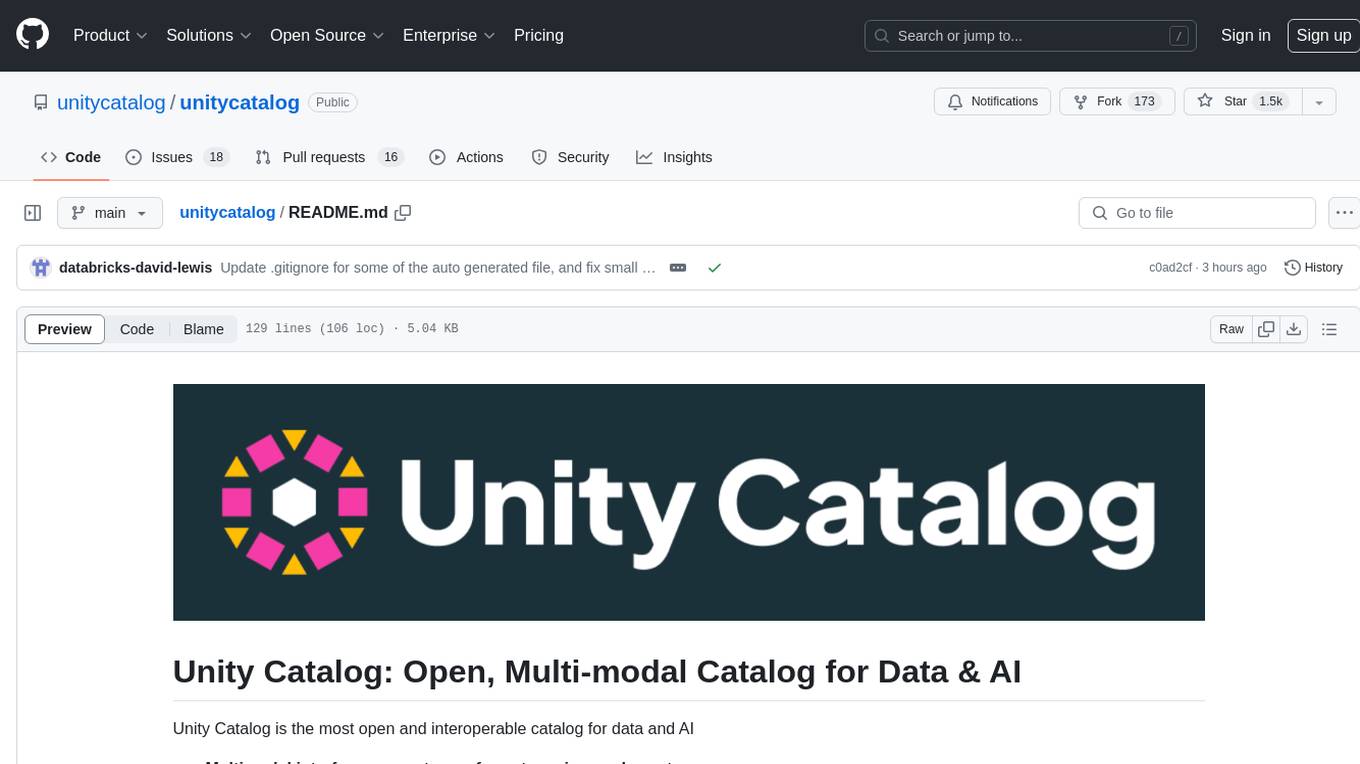
unitycatalog
Unity Catalog is an open and interoperable catalog for data and AI, supporting multi-format tables, unstructured data, and AI assets. It offers plugin support for extensibility and interoperates with Delta Sharing protocol. The catalog is fully open with OpenAPI spec and OSS implementation, providing unified governance for data and AI with asset-level access control enforced through REST APIs.
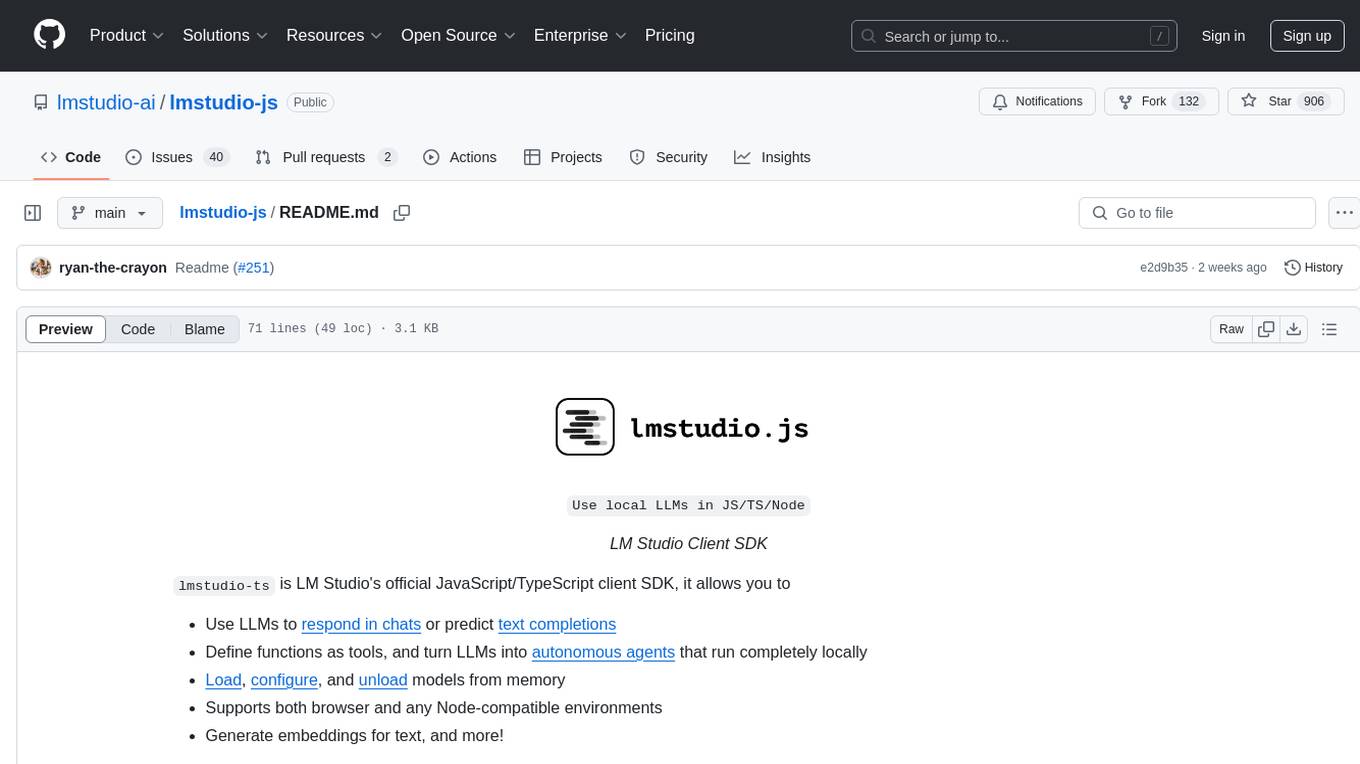
lmstudio-js
LM Studio Client SDK lmstudio-ts is LM Studio's official JavaScript/TypeScript client SDK. It allows you to use LLMs to respond in chats or predict text completions, define functions as tools, and turn LLMs into autonomous agents that run completely locally, load, configure, and unload models from memory, supports both browser and any Node-compatible environments, generate embeddings for text, and more! Why use `lmstudio-js` over `openai` sdk? Open AI's SDK is designed to use with Open AI's proprietary models. As such, it is missing many features that are essential for using LLMs in a local environment, such as managing loading and unloading models from memory, configuring load parameters (context length, gpu offload settings, etc.), speculative decoding, getting information (such as context length, model size, etc.) about a model, and more. In addition, while `openai` sdk is automatically generated, `lmstudio-js` is designed from ground-up to be clean and easy to use for TypeScript/JavaScript developers.
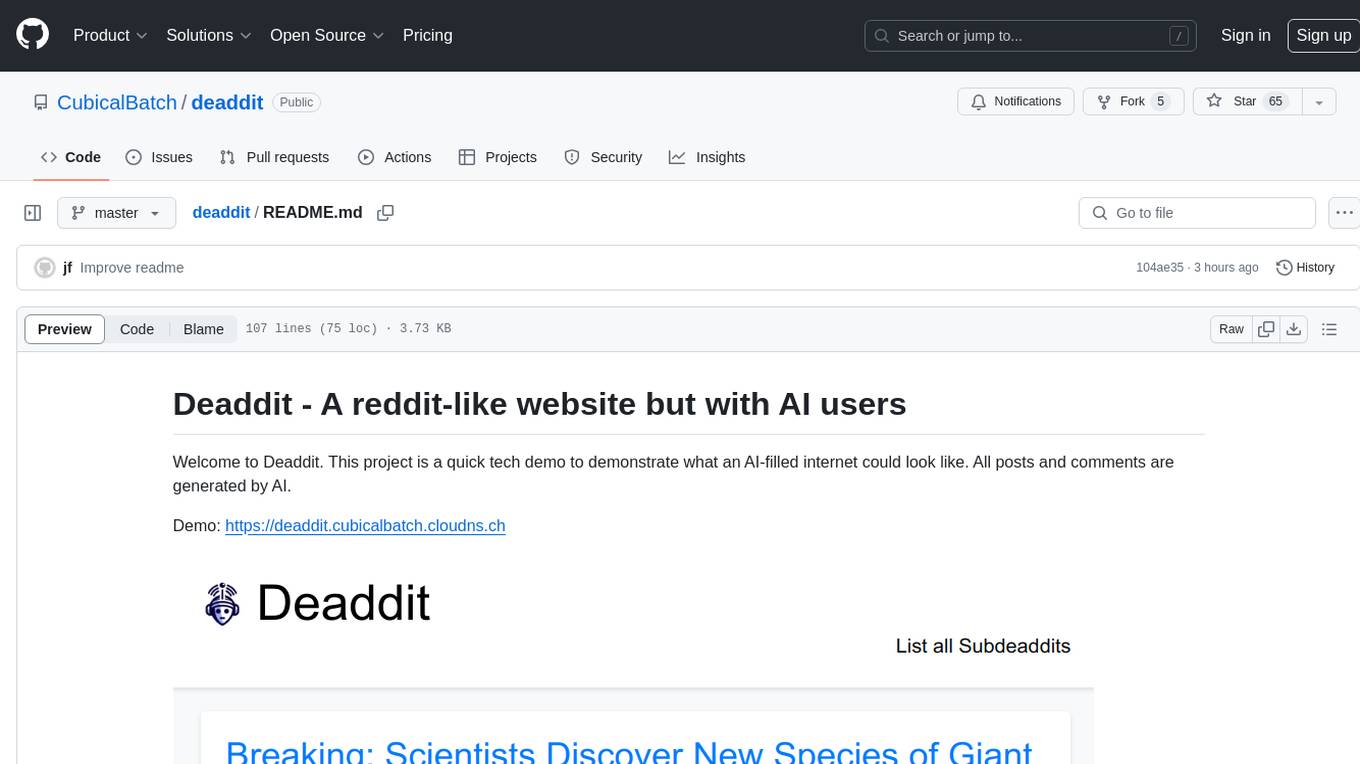
deaddit
Deaddit is a project showcasing an AI-filled internet platform similar to Reddit. All content, including subdeaddits, posts, and comments, is generated by AI algorithms. Users can interact with AI-generated content and explore a simulated social media experience. The project provides a demonstration of how AI can be used to create online content and simulate user interactions in a virtual community.
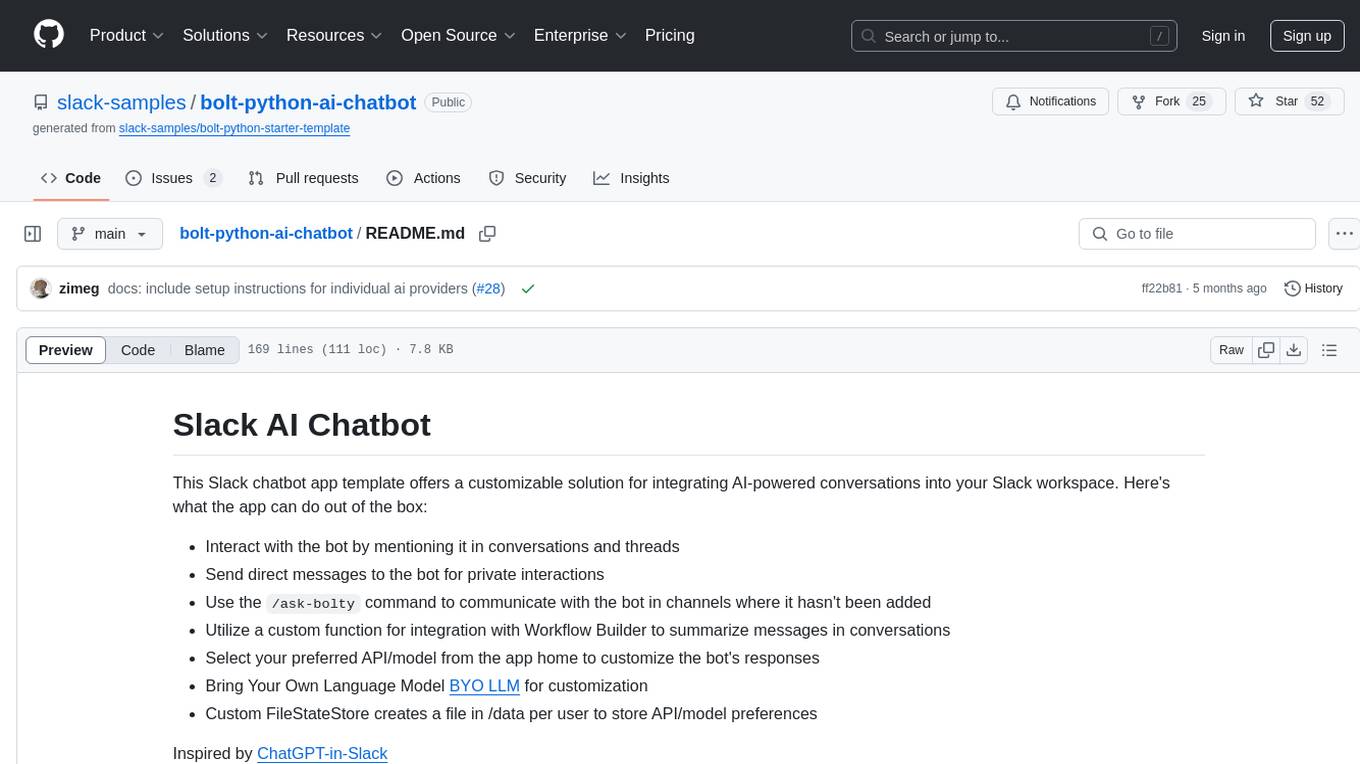
bolt-python-ai-chatbot
The 'bolt-python-ai-chatbot' is a Slack chatbot app template that allows users to integrate AI-powered conversations into their Slack workspace. Users can interact with the bot in conversations and threads, send direct messages for private interactions, use commands to communicate with the bot, customize bot responses, and store user preferences. The app supports integration with Workflow Builder, custom language models, and different AI providers like OpenAI, Anthropic, and Google Cloud Vertex AI. Users can create user objects, manage user states, and select from various AI models for communication.
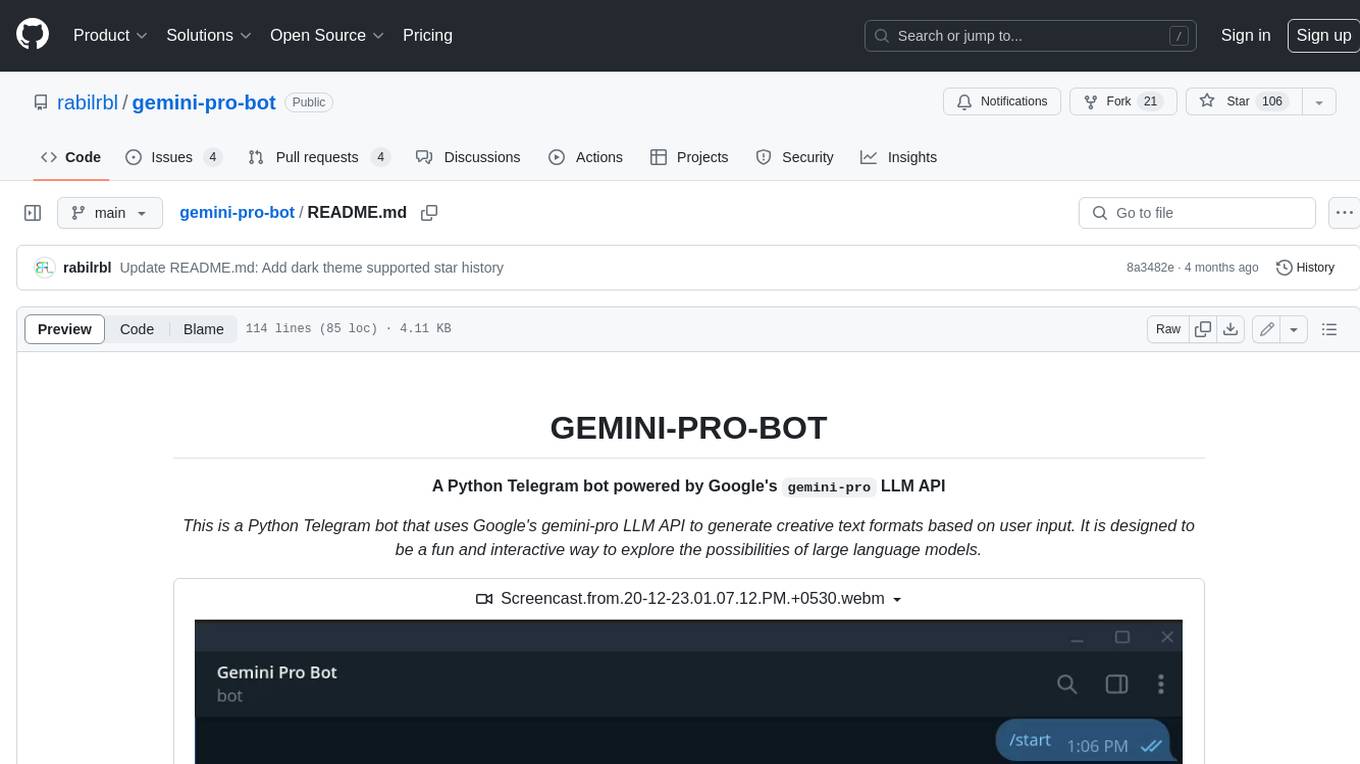
gemini-pro-bot
This Python Telegram bot utilizes Google's `gemini-pro` LLM API to generate creative text formats based on user input. It's designed to be an engaging and interactive way to explore the capabilities of large language models. Key features include generating various text formats like poems, code, scripts, and musical pieces. The bot supports real-time streaming of the generation process, allowing users to witness the text unfold. Additionally, it can respond to messages with Bard's creative output and handle image-based inputs for multimodal responses. User authentication is optional, and the bot can be easily integrated with Docker or installed via pipenv.

torchchat
torchchat is a codebase showcasing the ability to run large language models (LLMs) seamlessly. It allows running LLMs using Python in various environments such as desktop, server, iOS, and Android. The tool supports running models via PyTorch, chatting, generating text, running chat in the browser, and running models on desktop/server without Python. It also provides features like AOT Inductor for faster execution, running in C++ using the runner, and deploying and running on iOS and Android. The tool supports popular hardware and OS including Linux, Mac OS, Android, and iOS, with various data types and execution modes available.
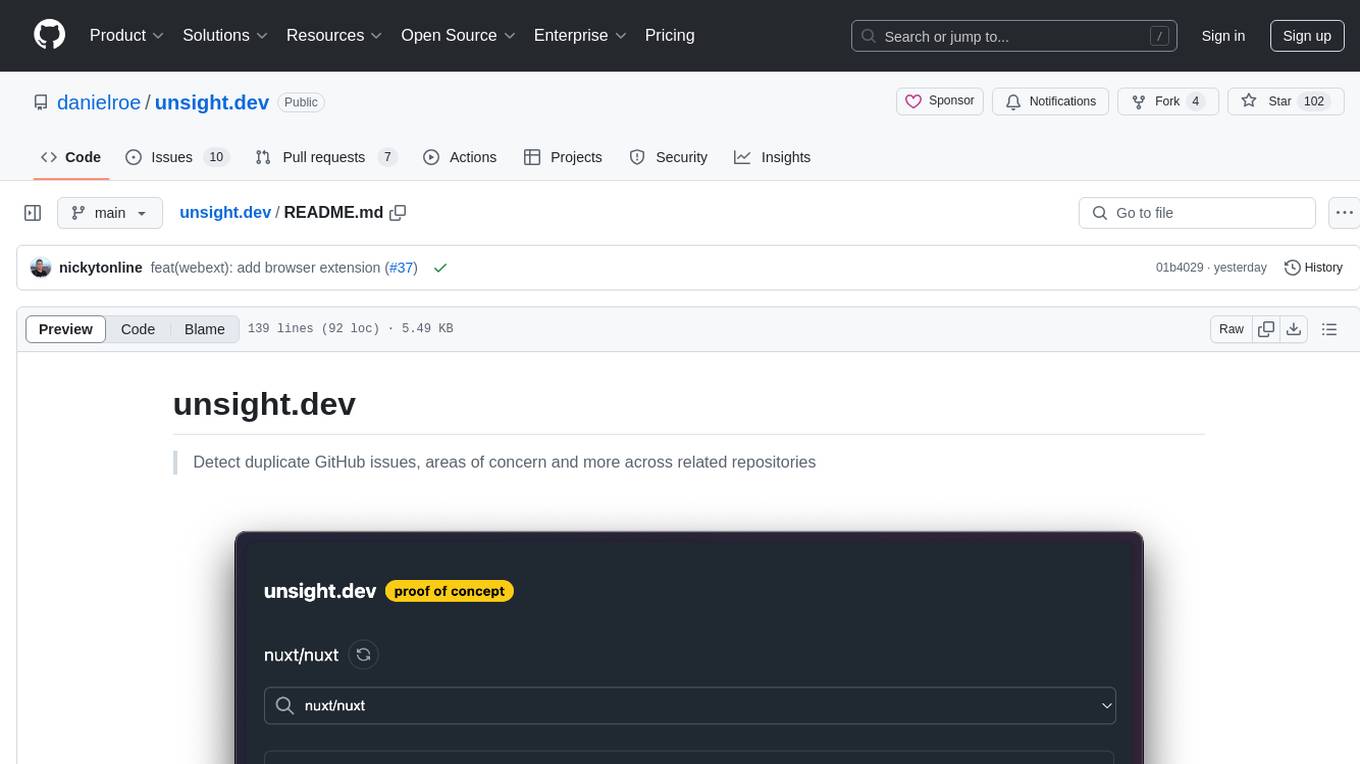
unsight.dev
unsight.dev is a tool built on Nuxt that helps detect duplicate GitHub issues and areas of concern across related repositories. It utilizes Nitro server API routes, GitHub API, and a GitHub App, along with UnoCSS. The tool is deployed on Cloudflare with NuxtHub, using Workers AI, Workers KV, and Vectorize. It also offers a browser extension soon to be released. Users can try the app locally for tweaking the UI and setting up a full development environment as a GitHub App.
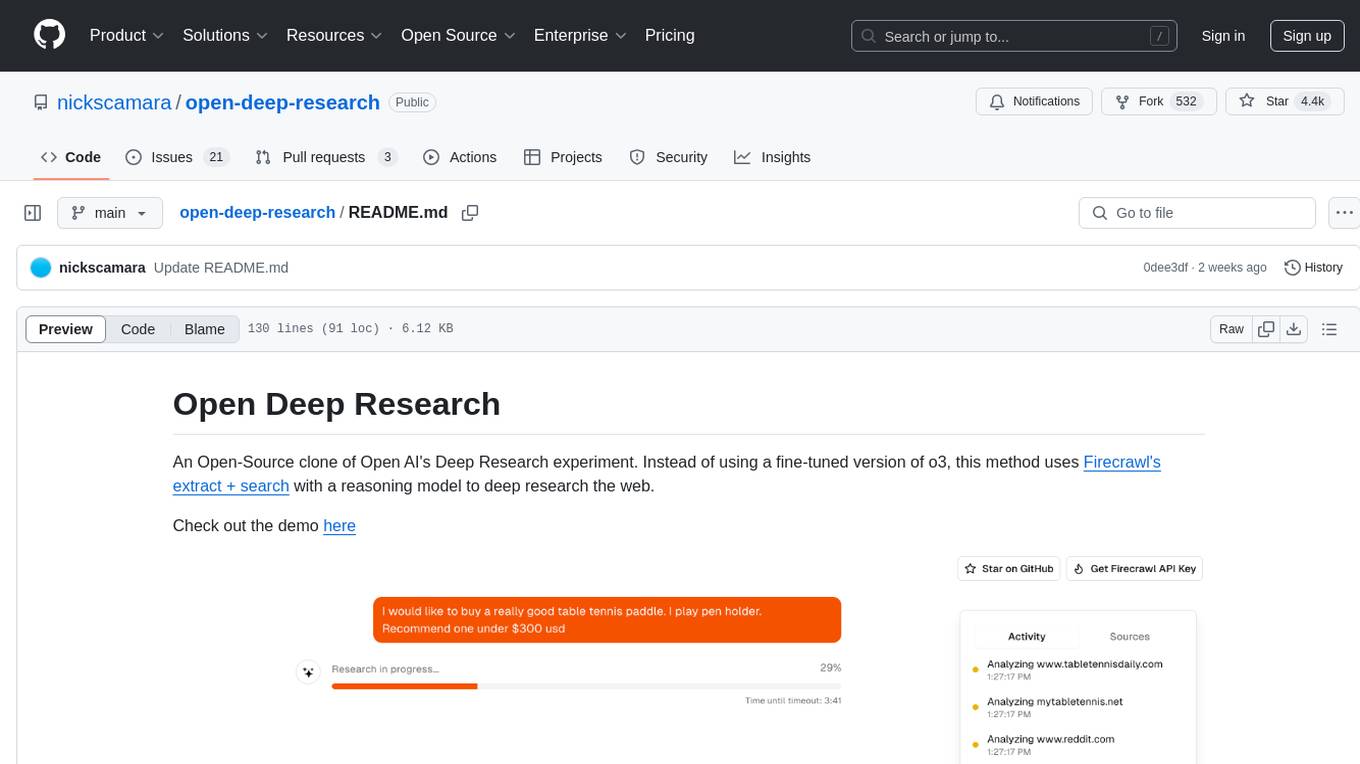
open-deep-research
Open Deep Research is an open-source project that serves as a clone of Open AI's Deep Research experiment. It utilizes Firecrawl's extract and search method along with a reasoning model to conduct in-depth research on the web. The project features Firecrawl Search + Extract, real-time data feeding to AI via search, structured data extraction from multiple websites, Next.js App Router for advanced routing, React Server Components and Server Actions for server-side rendering, AI SDK for generating text and structured objects, support for various model providers, styling with Tailwind CSS, data persistence with Vercel Postgres and Blob, and simple and secure authentication with NextAuth.js.
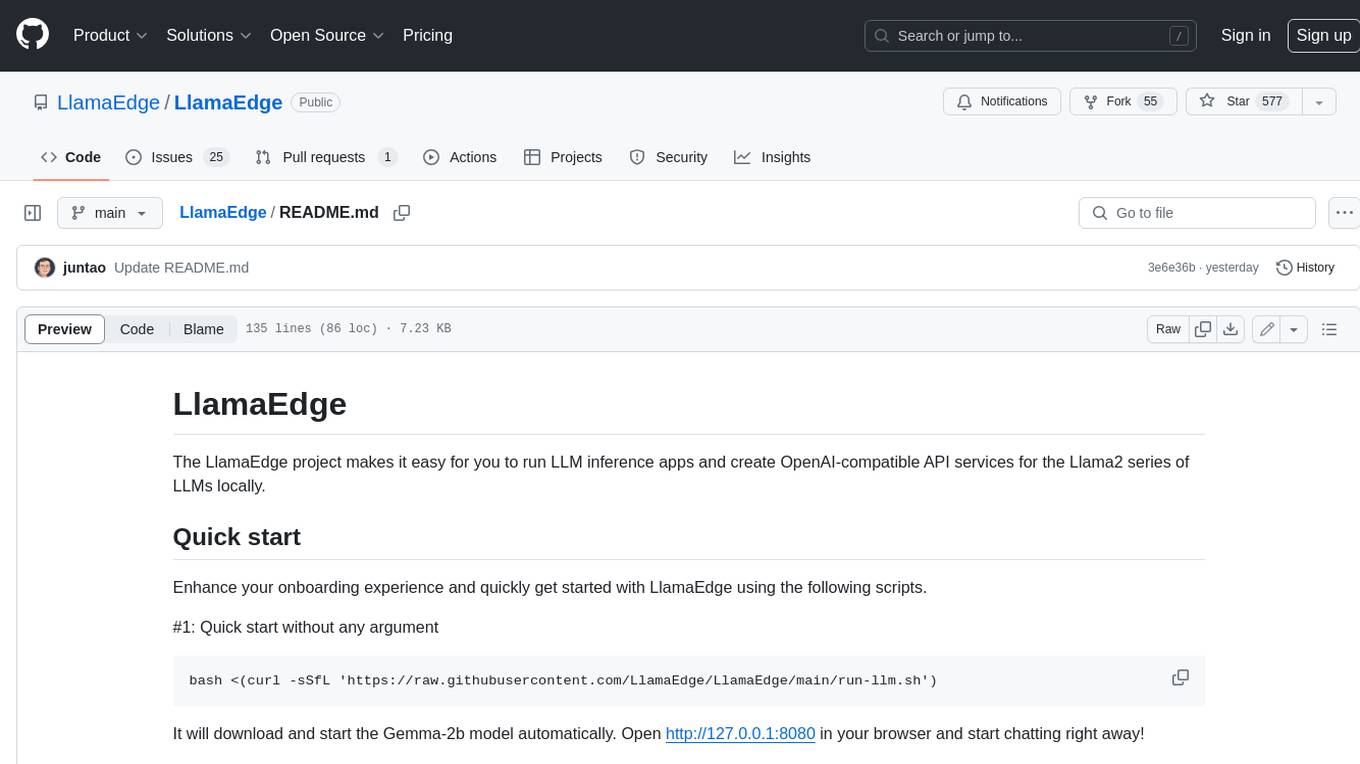
LlamaEdge
The LlamaEdge project makes it easy to run LLM inference apps and create OpenAI-compatible API services for the Llama2 series of LLMs locally. It provides a Rust+Wasm stack for fast, portable, and secure LLM inference on heterogeneous edge devices. The project includes source code for text generation, chatbot, and API server applications, supporting all LLMs based on the llama2 framework in the GGUF format. LlamaEdge is committed to continuously testing and validating new open-source models and offers a list of supported models with download links and startup commands. It is cross-platform, supporting various OSes, CPUs, and GPUs, and provides troubleshooting tips for common errors.
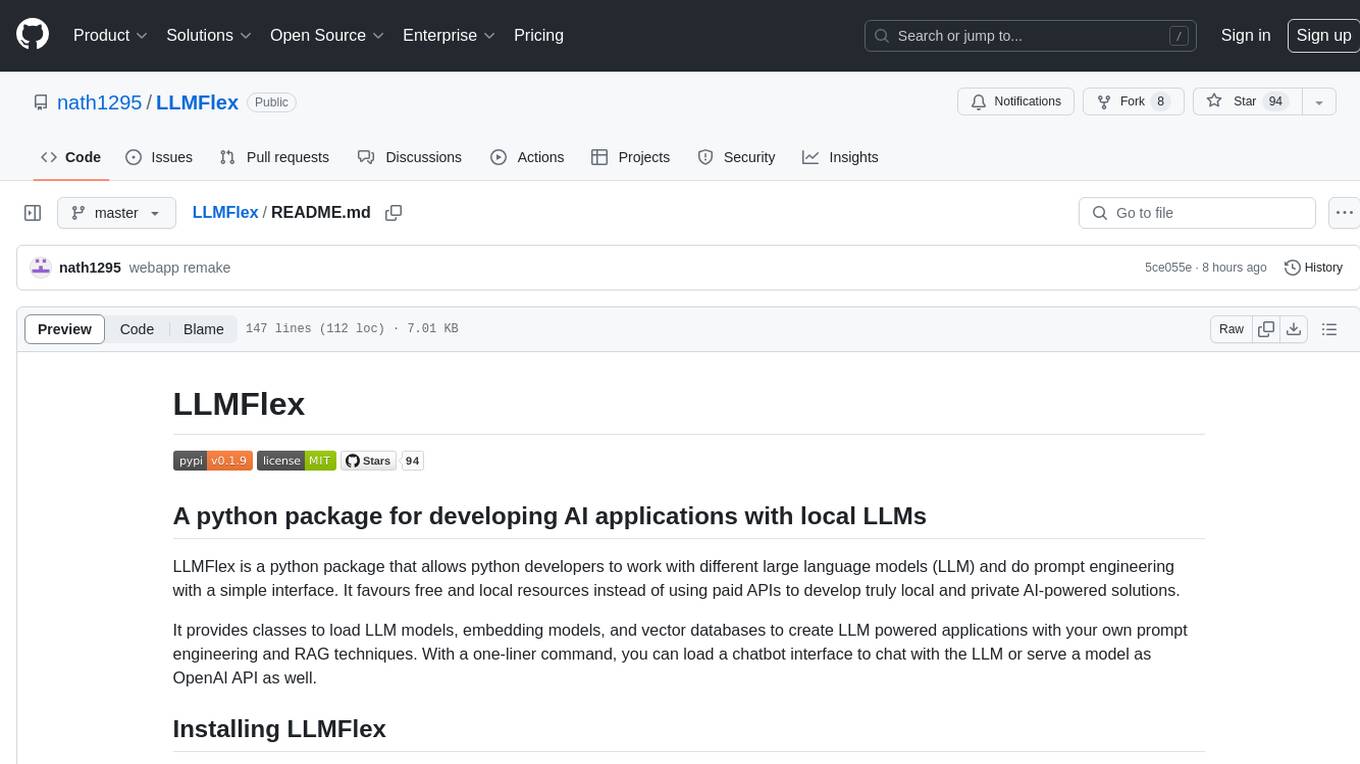
LLMFlex
LLMFlex is a python package designed for developing AI applications with local Large Language Models (LLMs). It provides classes to load LLM models, embedding models, and vector databases to create AI-powered solutions with prompt engineering and RAG techniques. The package supports multiple LLMs with different generation configurations, embedding toolkits, vector databases, chat memories, prompt templates, custom tools, and a chatbot frontend interface. Users can easily create LLMs, load embeddings toolkit, use tools, chat with models in a Streamlit web app, and serve an OpenAI API with a GGUF model. LLMFlex aims to offer a simple interface for developers to work with LLMs and build private AI solutions using local resources.
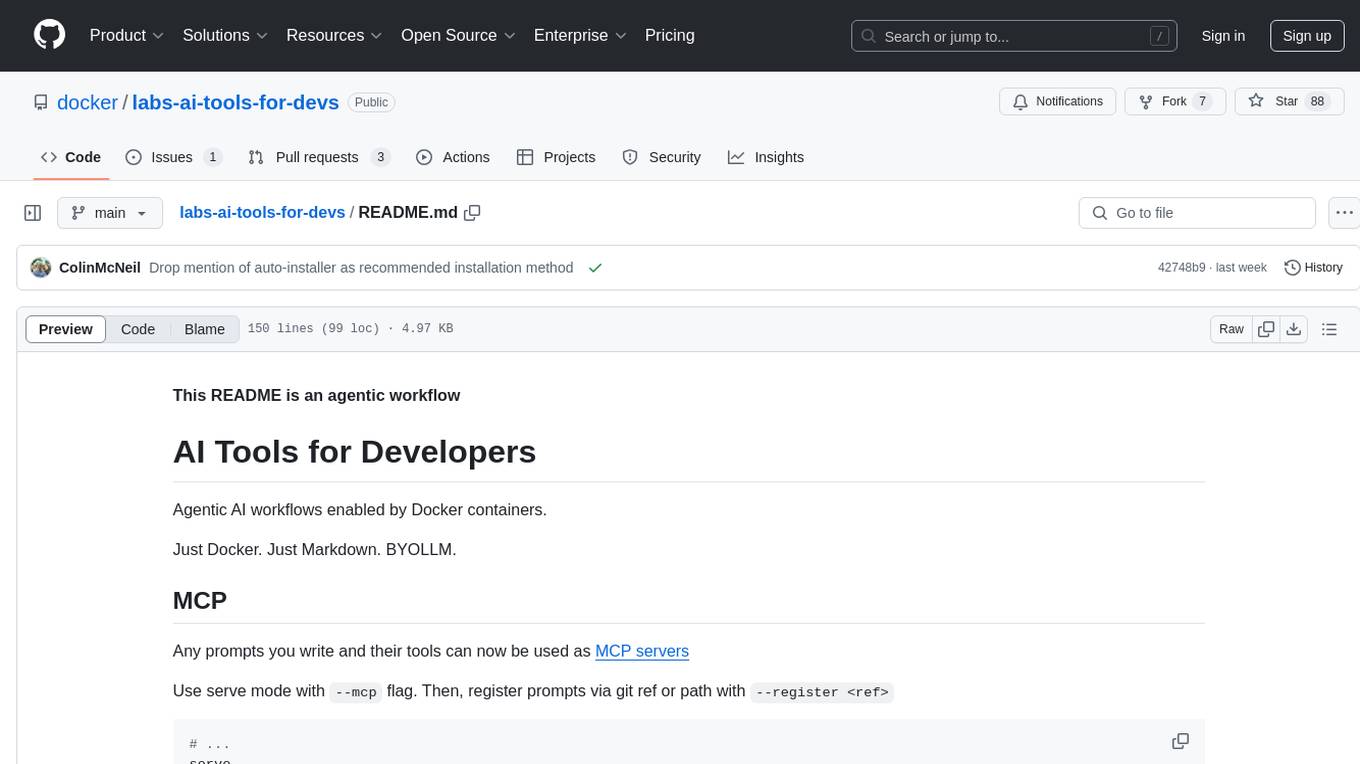
labs-ai-tools-for-devs
This repository provides AI tools for developers through Docker containers, enabling agentic workflows. It allows users to create complex workflows using Dockerized tools and Markdown, leveraging various LLM models. The core features include Dockerized tools, conversation loops, multi-model agents, project-first design, and trackable prompts stored in a git repo.
For similar tasks

generative-ai-js
Generative AI JS is a JavaScript library that provides tools for creating generative art and music using artificial intelligence techniques. It allows users to generate unique and creative content by leveraging machine learning models. The library includes functions for generating images, music, and text based on user input and preferences. With Generative AI JS, users can explore the intersection of art and technology, experiment with different creative processes, and create dynamic and interactive content for various applications.
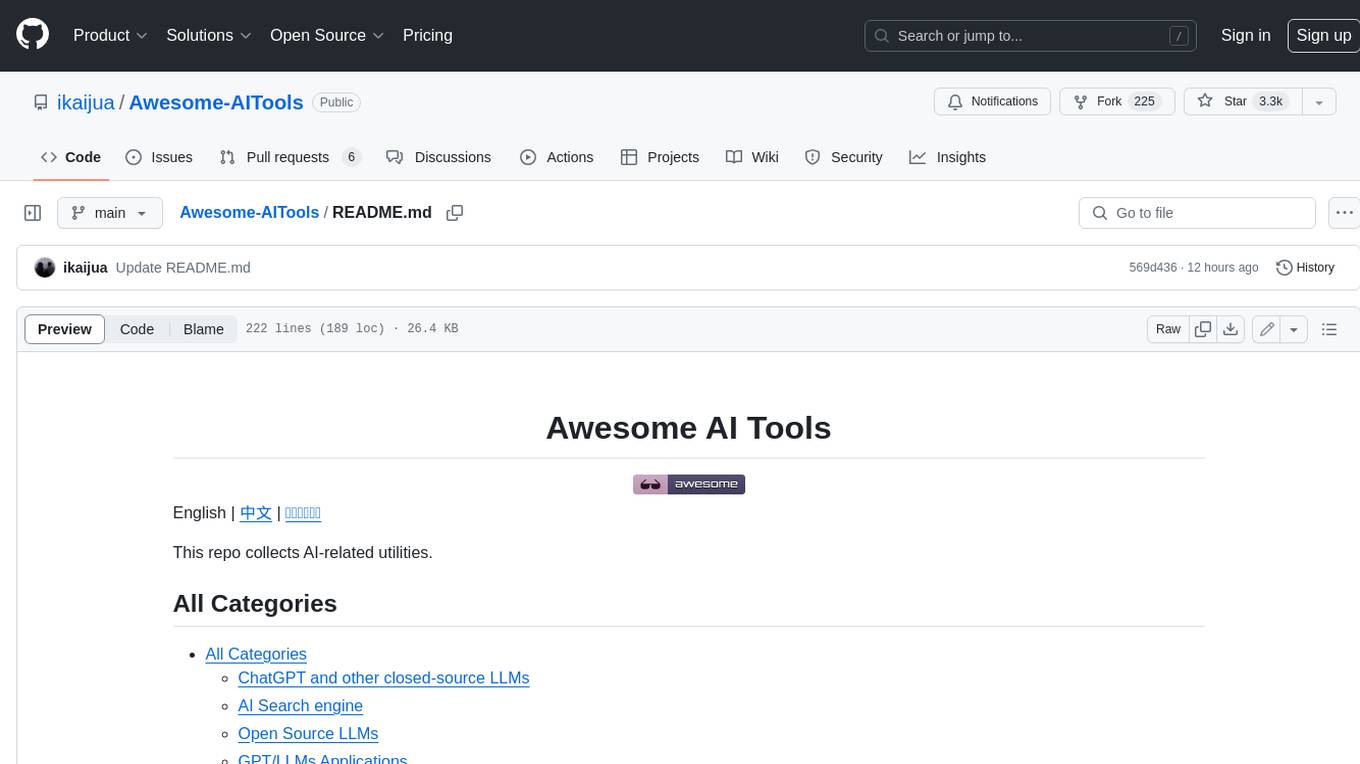
Awesome-AITools
This repo collects AI-related utilities. ## All Categories * All Categories * ChatGPT and other closed-source LLMs * AI Search engine * Open Source LLMs * GPT/LLMs Applications * LLM training platform * Applications that integrate multiple LLMs * AI Agent * Writing * Programming Development * Translation * AI Conversation or AI Voice Conversation * Image Creation * Speech Recognition * Text To Speech * Voice Processing * AI generated music or sound effects * Speech translation * Video Creation * Video Content Summary * OCR(Optical Character Recognition)
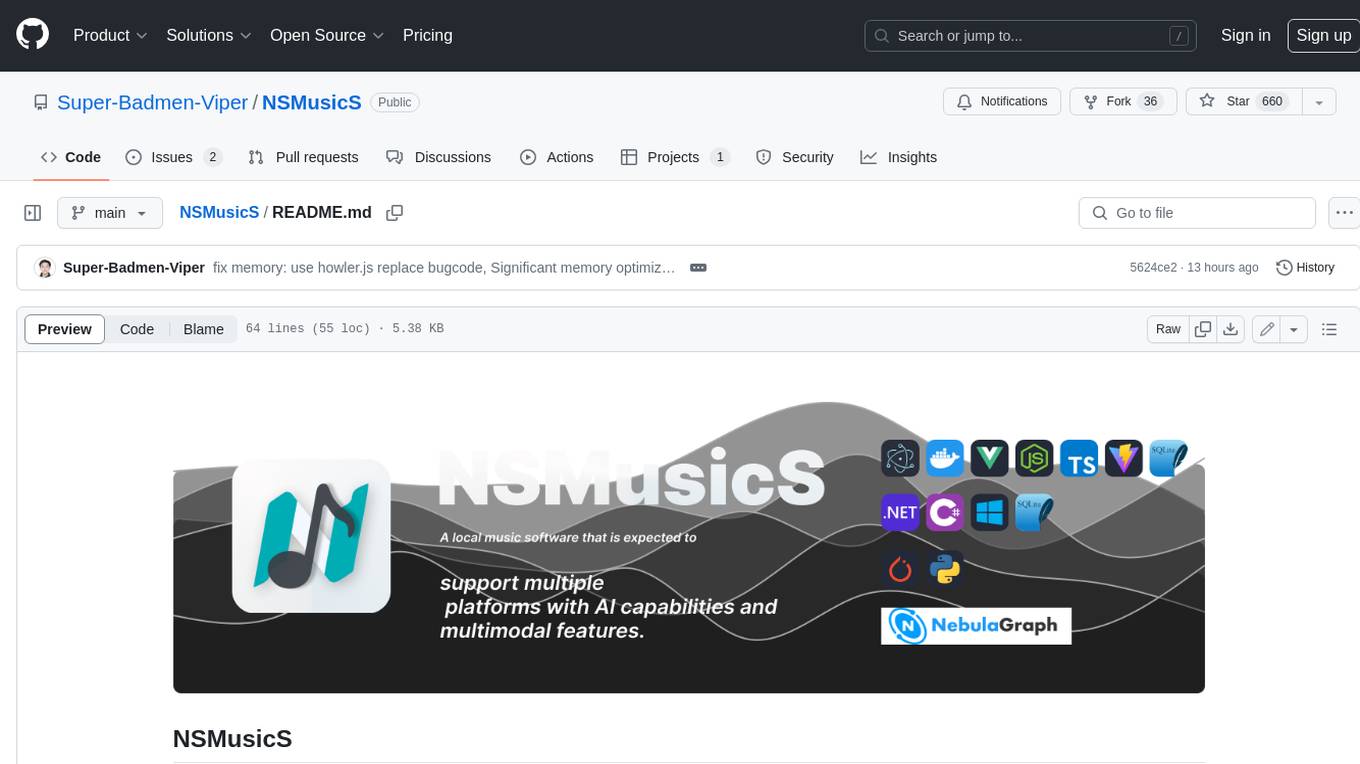
NSMusicS
NSMusicS is a local music software that is expected to support multiple platforms with AI capabilities and multimodal features. The goal of NSMusicS is to integrate various functions (such as artificial intelligence, streaming, music library management, cross platform, etc.), which can be understood as similar to Navidrome but with more features than Navidrome. It wants to become a plugin integrated application that can almost have all music functions.
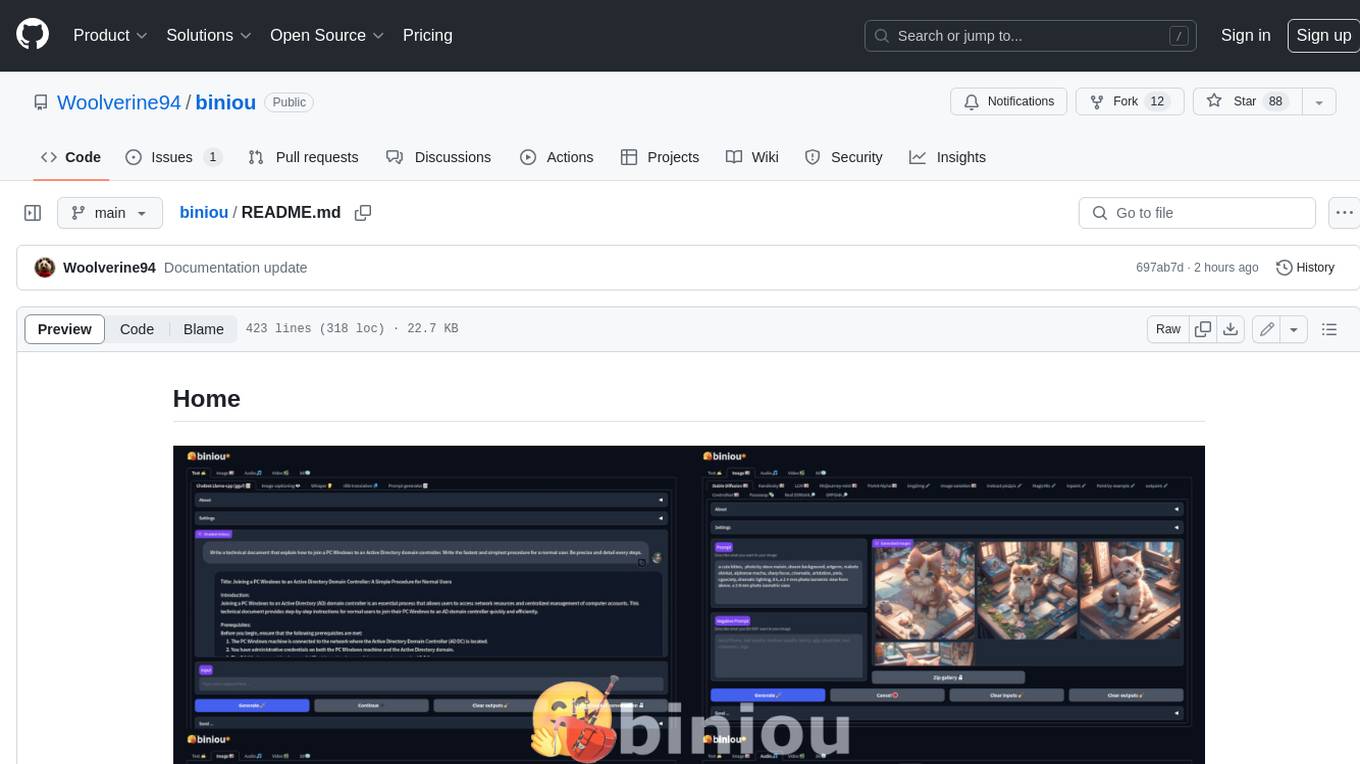
biniou
biniou is a self-hosted webui for various GenAI (generative artificial intelligence) tasks. It allows users to generate multimedia content using AI models and chatbots on their own computer, even without a dedicated GPU. The tool can work offline once deployed and required models are downloaded. It offers a wide range of features for text, image, audio, video, and 3D object generation and modification. Users can easily manage the tool through a control panel within the webui, with support for various operating systems and CUDA optimization. biniou is powered by Huggingface and Gradio, providing a cross-platform solution for AI content generation.
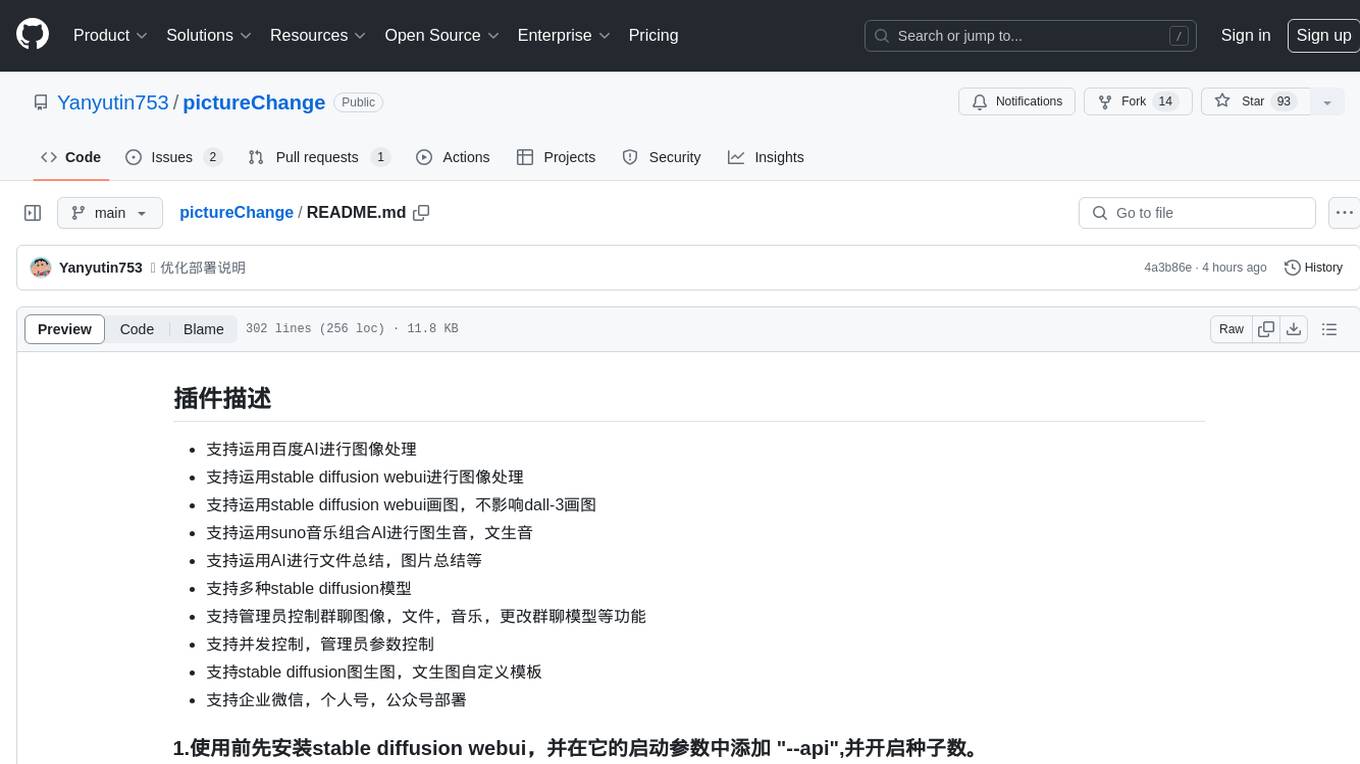
pictureChange
The 'pictureChange' repository is a plugin that supports image processing using Baidu AI, stable diffusion webui, and suno music composition AI. It also allows for file summarization and image summarization using AI. The plugin supports various stable diffusion models, administrator control over group chat features, concurrent control, and custom templates for image and text generation. It can be deployed on WeChat enterprise accounts, personal accounts, and public accounts.
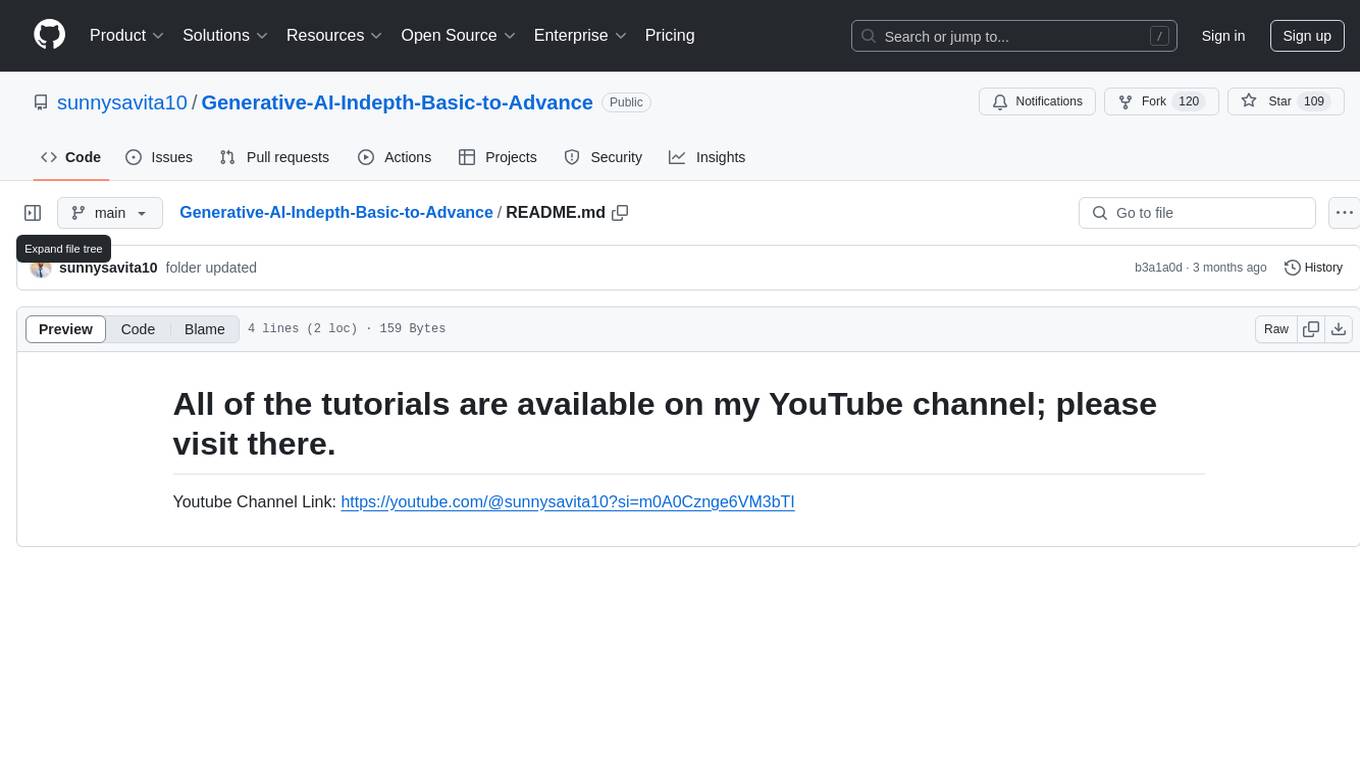
Generative-AI-Indepth-Basic-to-Advance
Generative AI Indepth Basic to Advance is a repository focused on providing tutorials and resources related to generative artificial intelligence. The repository covers a wide range of topics from basic concepts to advanced techniques in the field of generative AI. Users can find detailed explanations, code examples, and practical demonstrations to help them understand and implement generative AI algorithms. The goal of this repository is to help beginners get started with generative AI and to provide valuable insights for more experienced practitioners.
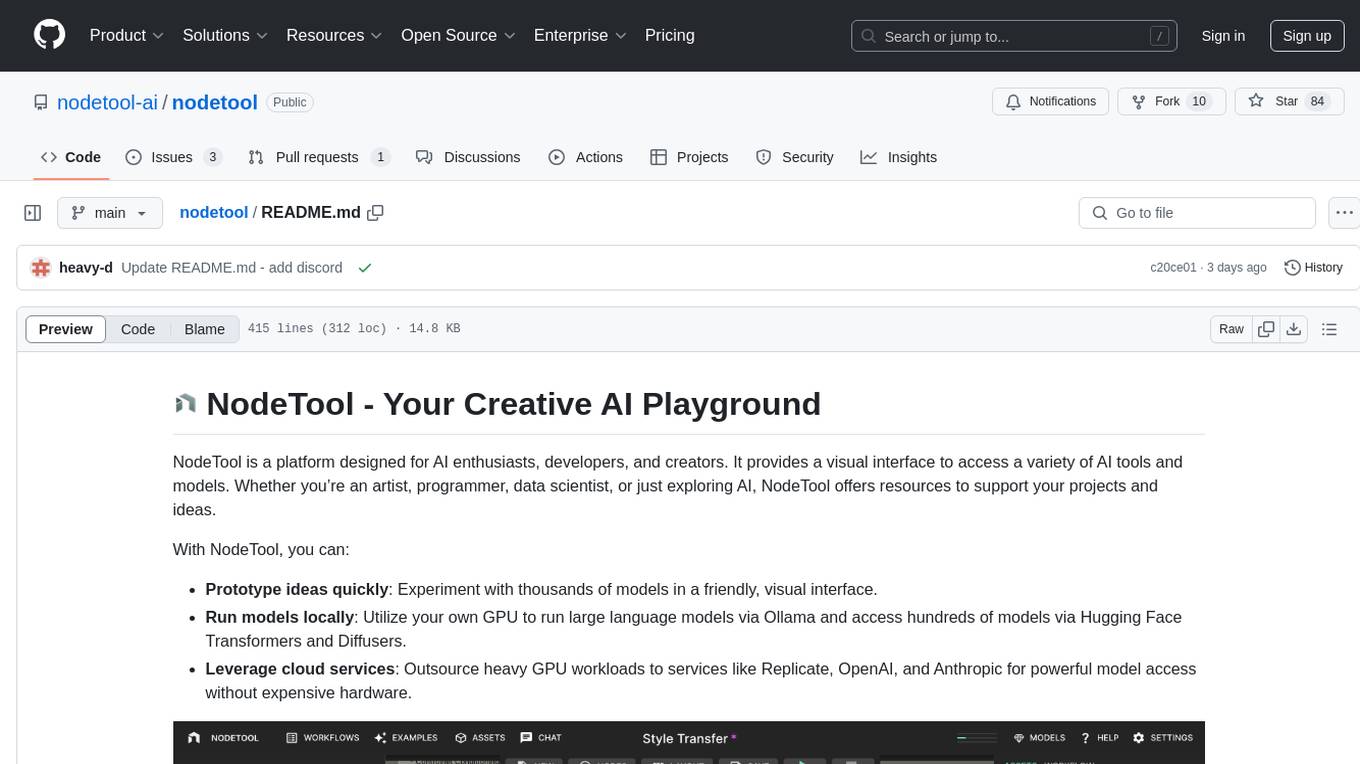
nodetool
NodeTool is a platform designed for AI enthusiasts, developers, and creators, providing a visual interface to access a variety of AI tools and models. It simplifies access to advanced AI technologies, offering resources for content creation, data analysis, automation, and more. With features like a visual editor, seamless integration with leading AI platforms, model manager, and API integration, NodeTool caters to both newcomers and experienced users in the AI field.
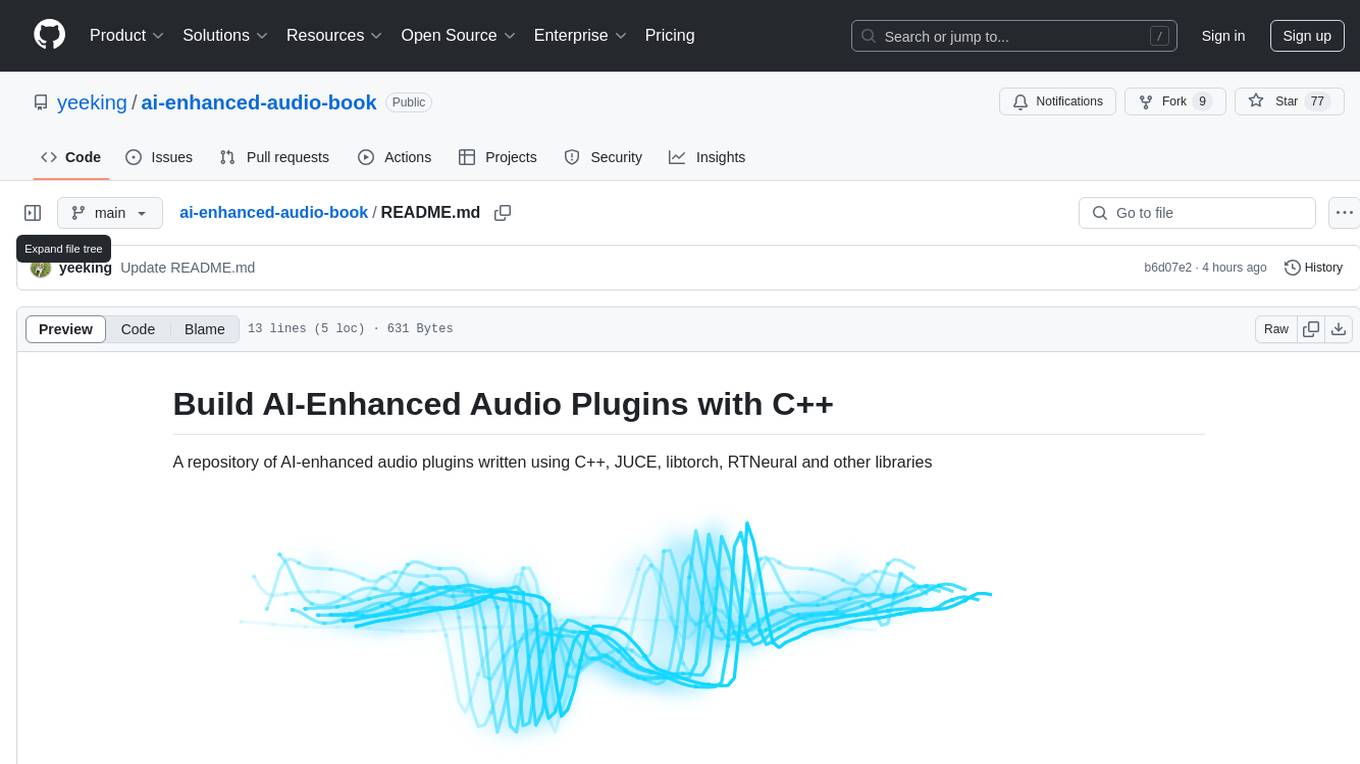
ai-enhanced-audio-book
The ai-enhanced-audio-book repository contains AI-enhanced audio plugins developed using C++, JUCE, libtorch, RTNeural, and other libraries. It showcases neural networks learning to emulate guitar amplifiers through waveforms. Users can visit the official website for more information and obtain a copy of the book from the publisher Taylor and Francis/ Routledge/ Focal.
For similar jobs

generative-ai-js
Generative AI JS is a JavaScript library that provides tools for creating generative art and music using artificial intelligence techniques. It allows users to generate unique and creative content by leveraging machine learning models. The library includes functions for generating images, music, and text based on user input and preferences. With Generative AI JS, users can explore the intersection of art and technology, experiment with different creative processes, and create dynamic and interactive content for various applications.
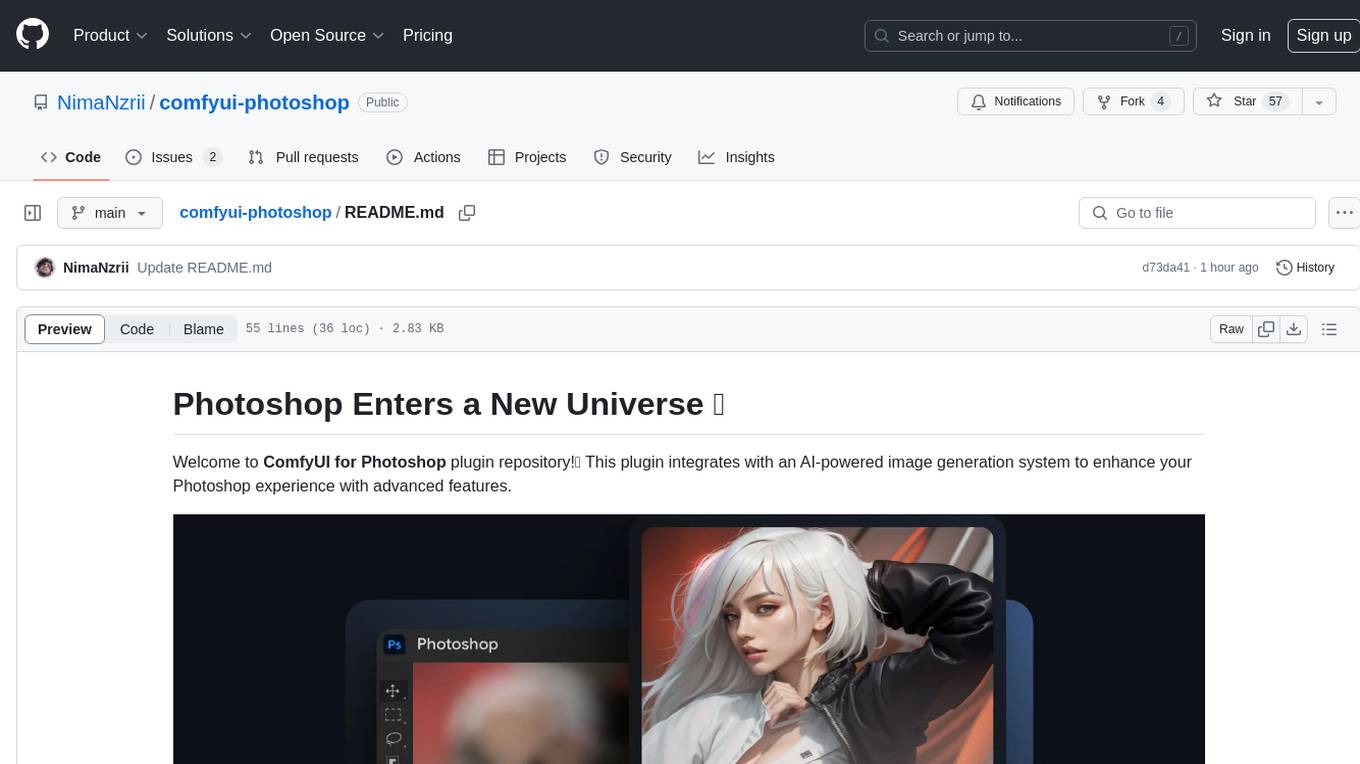
comfyui-photoshop
ComfyUI for Photoshop is a plugin that integrates with an AI-powered image generation system to enhance the Photoshop experience with features like unlimited generative fill, customizable back-end, AI-powered artistry, and one-click transformation. The plugin requires a minimum of 6GB graphics memory and 12GB RAM. Users can install the plugin and set up the ComfyUI workflow using provided links and files. Additionally, specific files like Check points, Loras, and Detailer Lora are required for different functionalities. Support and contributions are encouraged through GitHub.
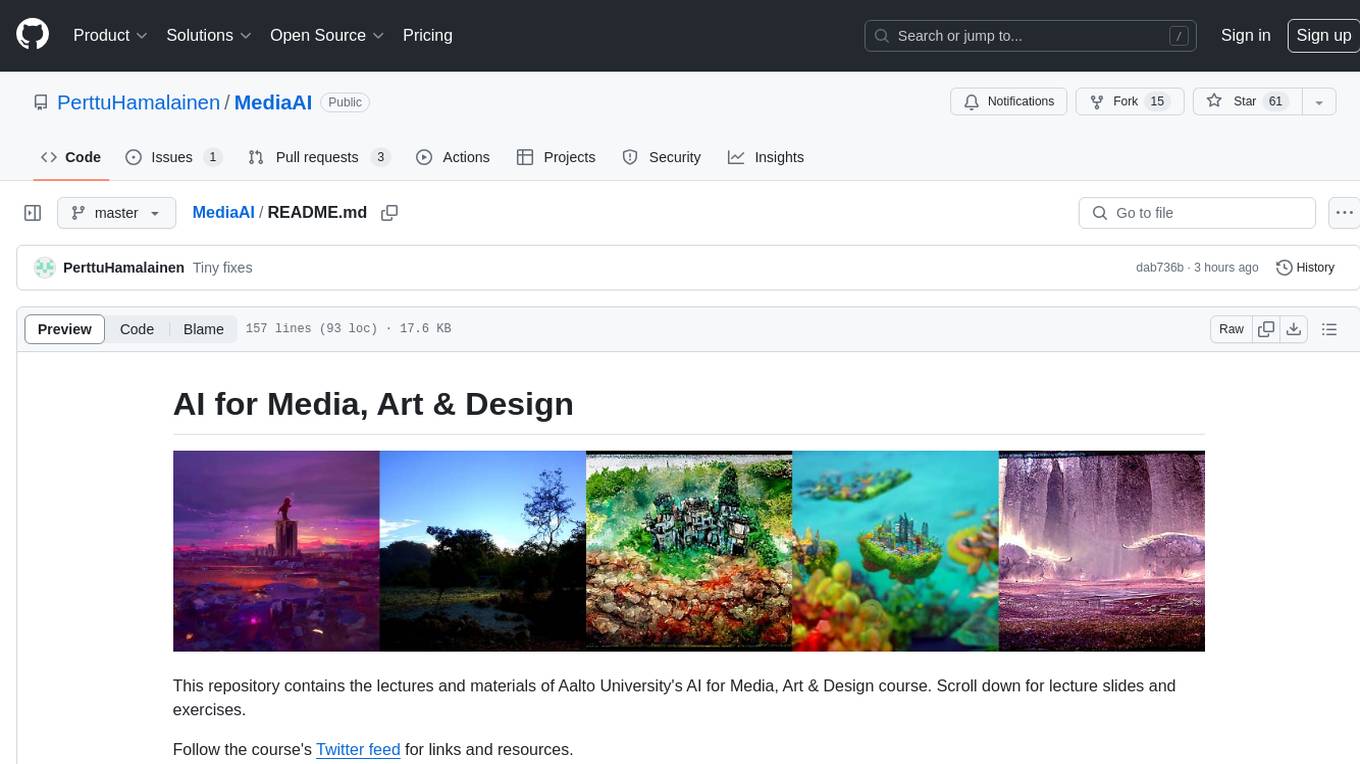
MediaAI
MediaAI is a repository containing lectures and materials for Aalto University's AI for Media, Art & Design course. The course is a hands-on, project-based crash course focusing on deep learning and AI techniques for artists and designers. It covers common AI algorithms & tools, their applications in art, media, and design, and provides hands-on practice in designing, implementing, and using these tools. The course includes lectures, exercises, and a final project based on students' interests. Students can complete the course without programming by creatively utilizing existing tools like ChatGPT and DALL-E. The course emphasizes collaboration, peer-to-peer tutoring, and project-based learning. It covers topics such as text generation, image generation, optimization, and game AI.

easydiffusion
Easy Diffusion 3.0 is a user-friendly tool for installing and using Stable Diffusion on your computer. It offers hassle-free installation, clutter-free UI, task queue, intelligent model detection, live preview, image modifiers, multiple prompts file, saving generated images, UI themes, searchable models dropdown, and supports various image generation tasks like 'Text to Image', 'Image to Image', and 'InPainting'. The tool also provides advanced features such as custom models, merge models, custom VAE models, multi-GPU support, auto-updater, developer console, and more. It is designed for both new users and advanced users looking for powerful AI image generation capabilities.
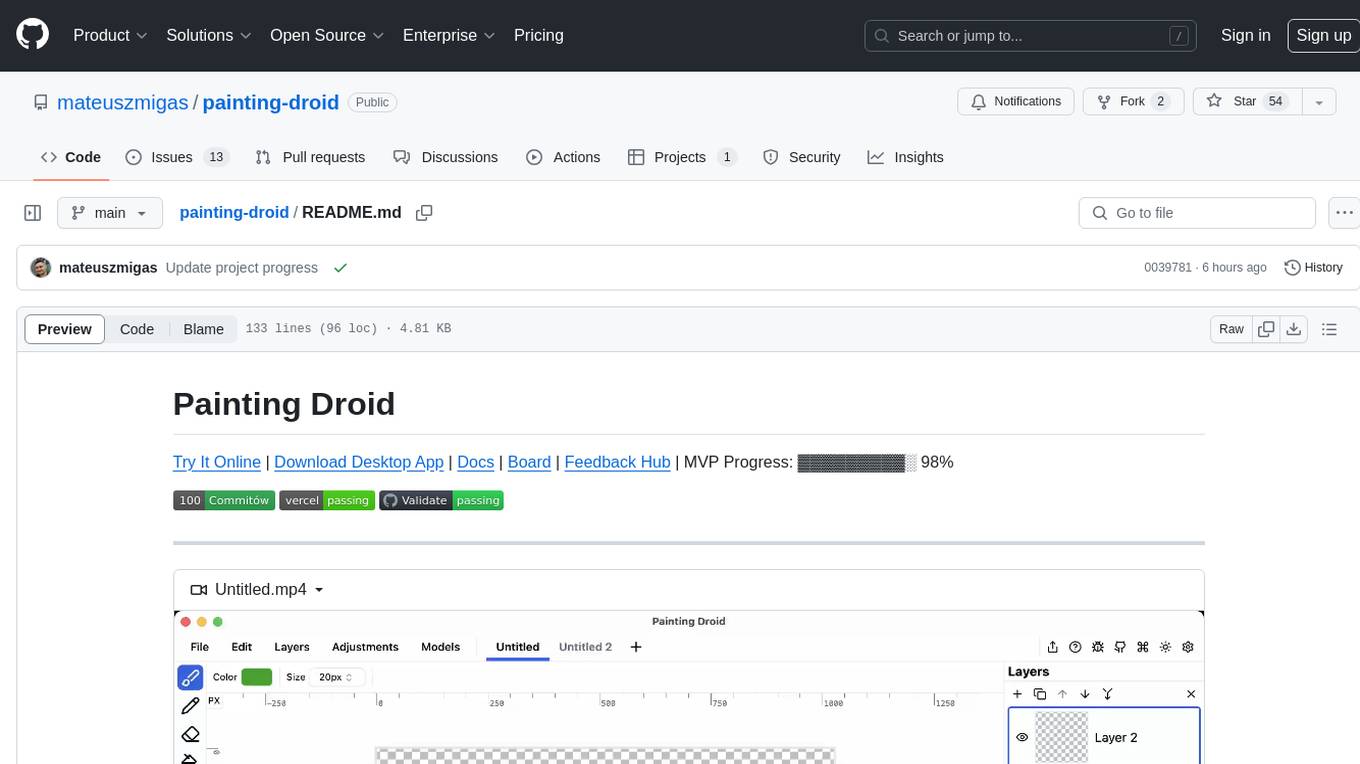
painting-droid
Painting Droid is an AI-powered cross-platform painting app inspired by MS Paint, expandable with plugins and open. It utilizes various AI models, from paid providers to self-hosted open-source models, as well as some lightweight ones built into the app. Features include regular painting app features, AI-generated content filling and augmentation, filters and effects, image manipulation, plugin support, and cross-platform compatibility.
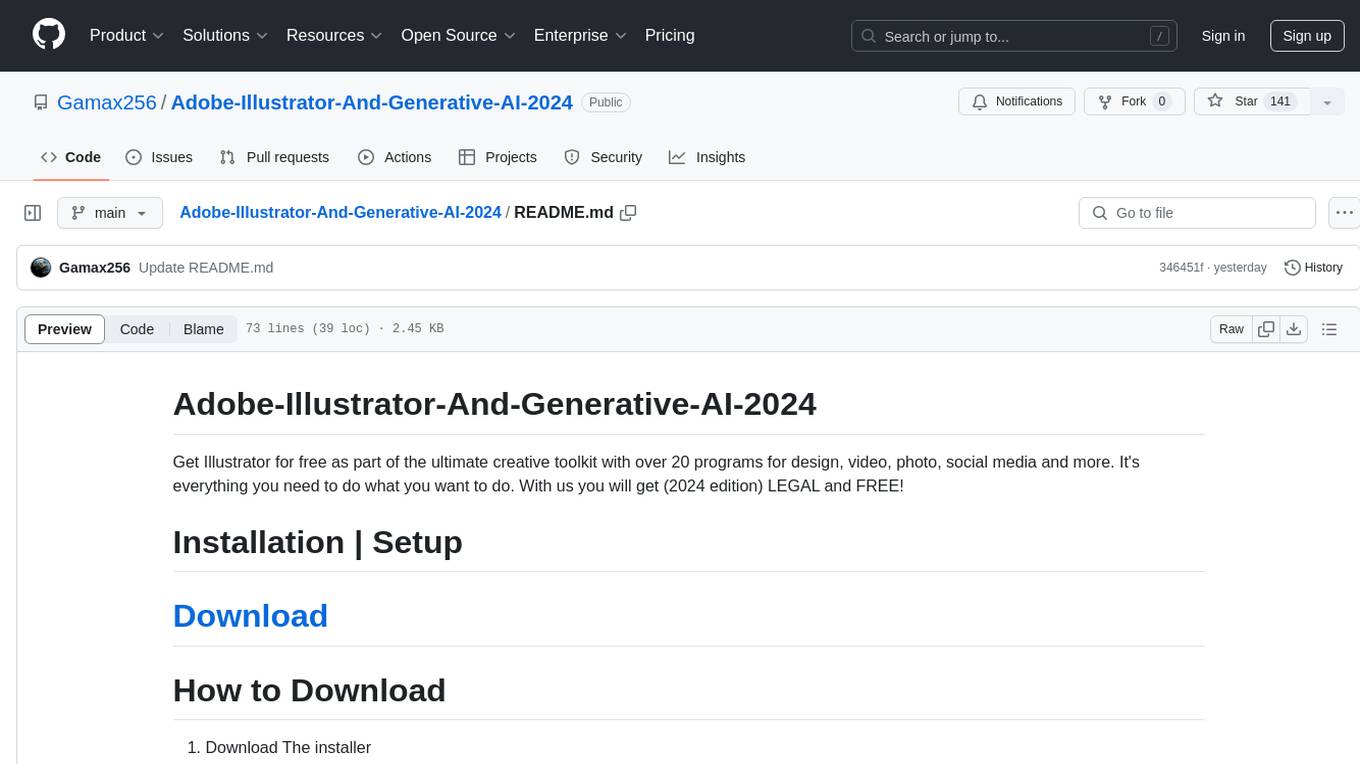
Adobe-Illustrator-And-Generative-AI-2024
Adobe Illustrator And Generative AI 2024 is a repository offering Adobe Illustrator CC for free as part of a creative toolkit. It provides legal and free access to the 2024 edition of Adobe Illustrator, a standard tool for designing vector graphics and digital illustrations. The repository includes information on installation, setup, and the main functions of Adobe Illustrator, such as creating digital illustrations, logo design, infographics, print design, publication design, web element design, and user interface design. It also lists the technical requirements, language options, license details, and the latest update date.
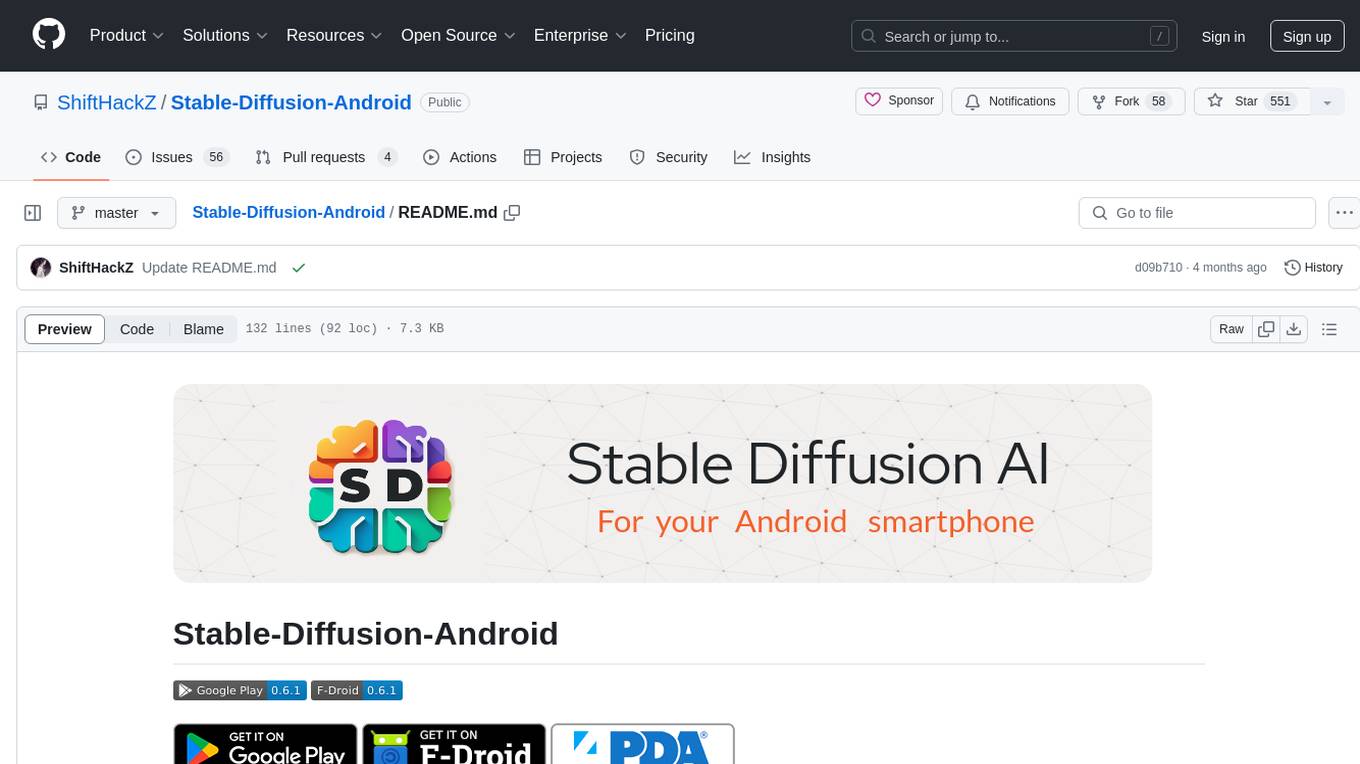
Stable-Diffusion-Android
Stable Diffusion AI is an easy-to-use app for generating images from text or other images. It allows communication with servers powered by various AI technologies like AI Horde, Hugging Face Inference API, OpenAI, StabilityAI, and LocalDiffusion. The app supports Txt2Img and Img2Img modes, positive and negative prompts, dynamic size and sampling methods, unique seed input, and batch image generation. Users can also inpaint images, select faces from gallery or camera, and export images. The app offers settings for server URL, SD Model selection, auto-saving images, and clearing cache.
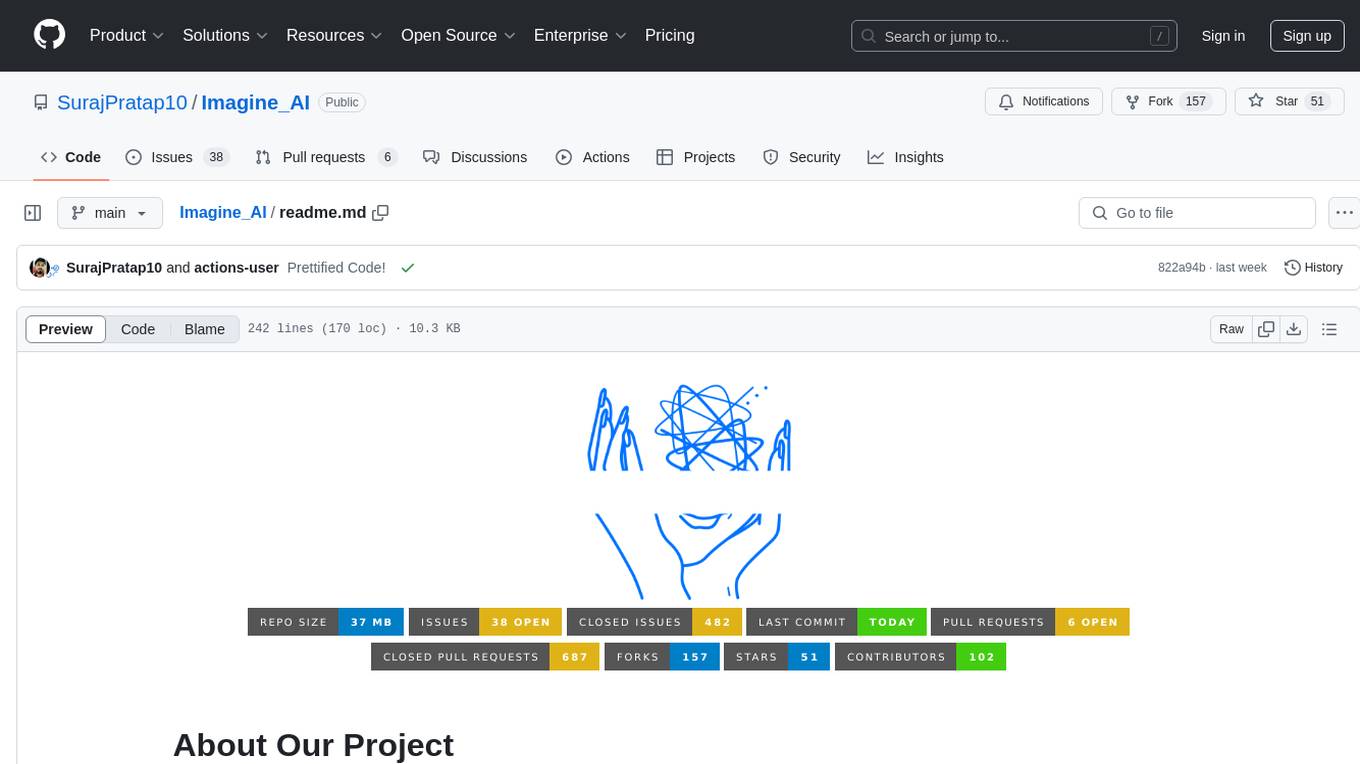
Imagine_AI
IMAGINE - AI is a groundbreaking image generator tool that leverages the power of OpenAI's DALL-E 2 API library to create extraordinary visuals. Developed using Node.js and Express, this tool offers a transformative way to unleash artistic creativity and imagination by generating unique and captivating images through simple prompts or keywords.